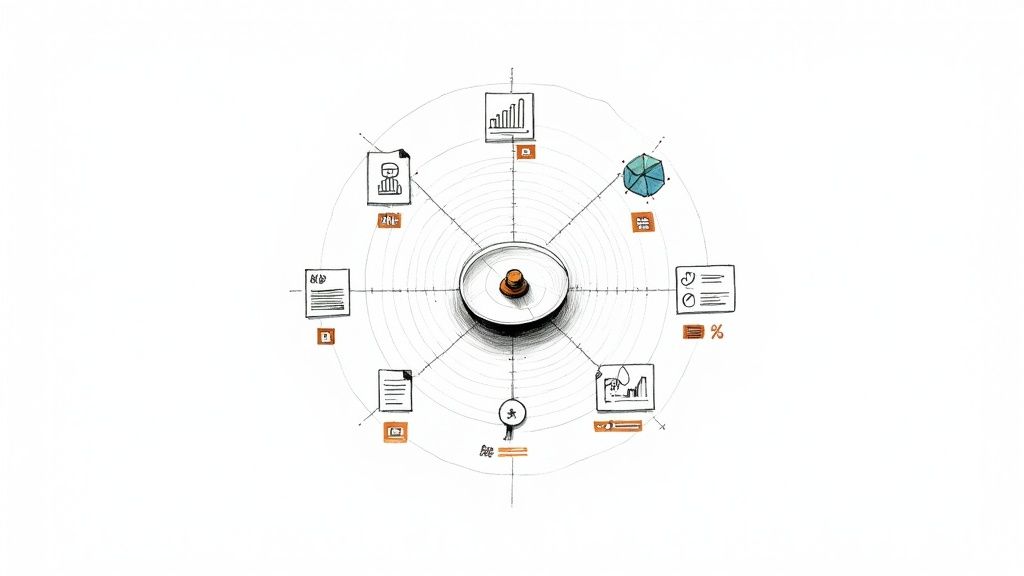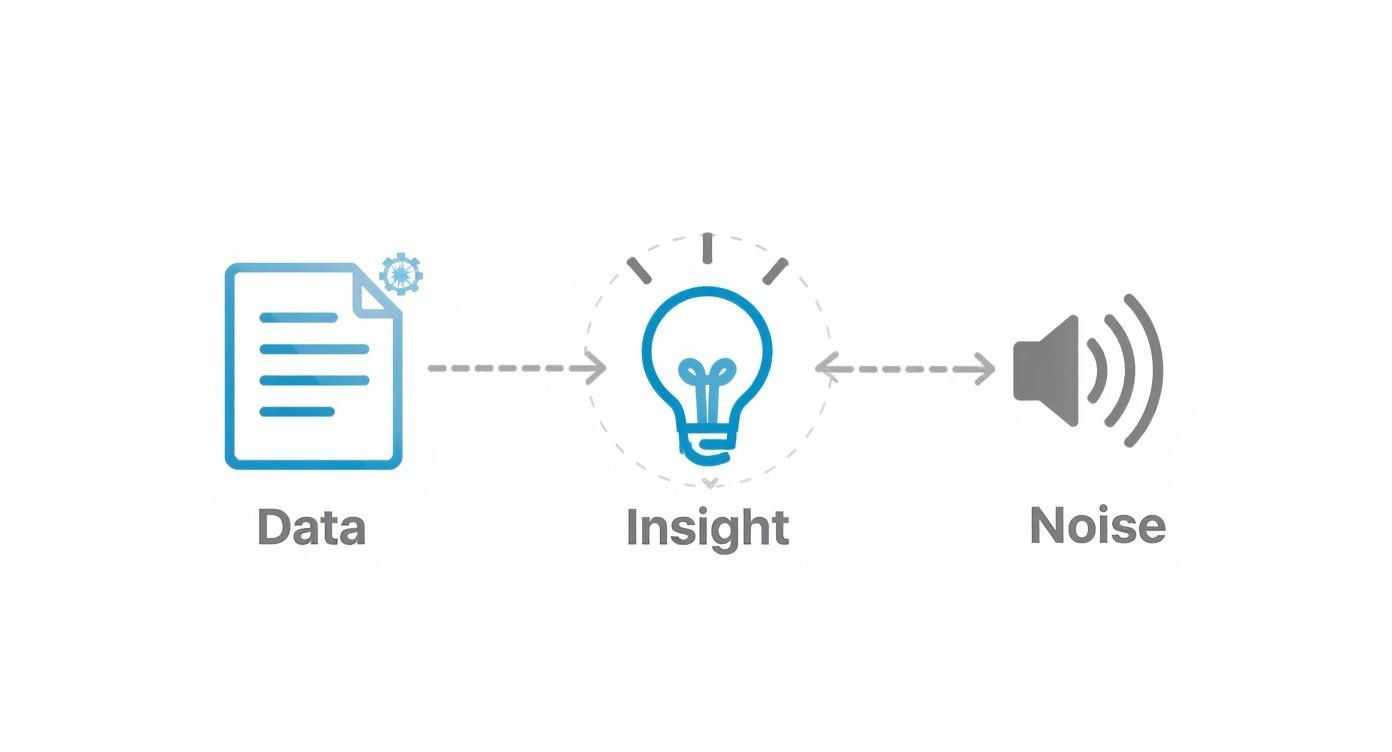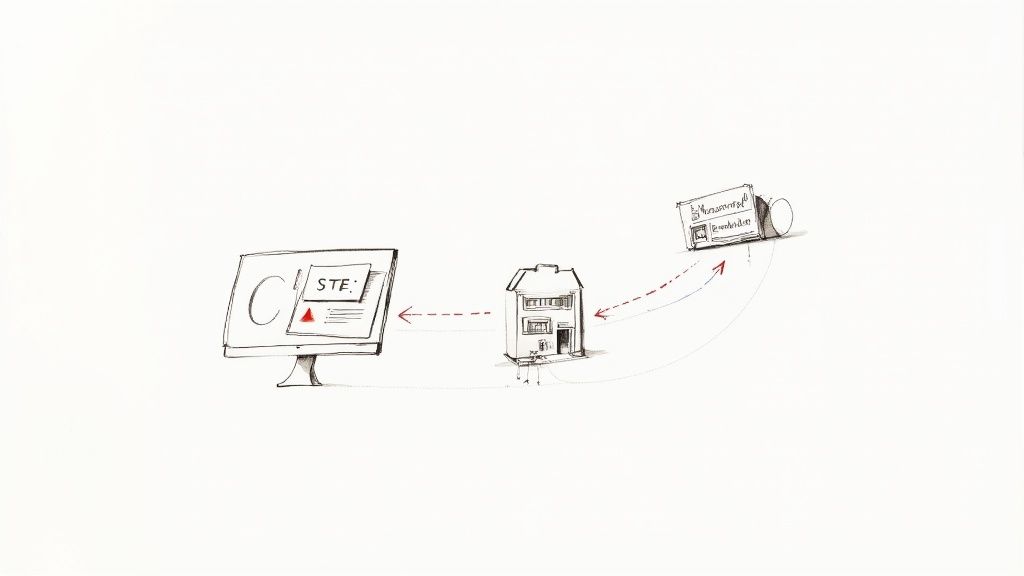What Are Market Intelligence Platforms? Good Question.
Stop guessing. Market intelligence platforms are the cheat code to win in your industry. Learn what they do, why you need one, and how to choose the right tool.

Let's be real—staring at a mountain of market data feels like trying to read tea leaves after three cups of coffee. And honestly, most definitions of "market intelligence" sound like they were written by a robot trying to sell you a dictionary.
So, let's cut the fluff. Market intelligence platforms are tools that automatically spy on your competitors, customers, and industry (legally, of course). Then, they turn all that internet noise into clear signals so you can stop guessing and start making moves based on what’s actually happening out there.
What Are Market Intelligence Platforms
Think of a market intelligence platform as a super-powered weather app for your business. A basic app tells you it's raining. A great one warns you about the hurricane coming next week, showing you wind patterns and pressure changes so you can, you know, board up the windows. That's what these platforms do.
They don’t just dump raw data on your desk; they give you the "so what?" behind it. Instead of you or your team wasting hours manually Googling competitors, these tools do the dirty work 24/7. They crawl everything from news articles and social media rants to customer reviews and competitor price hikes. Then, they use smart tech to connect the dots.
For example, you might suddenly see that:
- A rival just hired three new sales reps in a region you've been ignoring. (Uh oh.)
- Customers are complaining on Twitter about a feature your product is missing. (Yikes.)
- A new startup just got a truckload of cash to solve a problem you thought was a joke. (Not so funny now, is it?)
Turning Noise Into a Clear Signal
Without a platform, all this information is just random internet garbage. You might stumble upon one piece of the puzzle, but you'll almost certainly miss the bigger picture.
The real magic of market intelligence platforms is filtering out the junk and shining a spotlight on the insights that make you go, "Aha!" This process transforms a flood of scattered data into a handful of brilliant ideas you can actually use.
> The goal isn't just to collect more data; it's to find the right data that leads to smarter, faster decisions. It’s about replacing "I think" with "I know."
While big-name tools like Ahrefs or Semrush offer some of these features, they can be really expensive and feel like learning to fly a spaceship. For teams that need focused insights without the headache, a platform like already.dev offers a powerful alternative. It automates the research, freeing you up to focus on strategy instead of getting lost in spreadsheets. For a deeper dive, you can explore more about what marketing intelligence is and why it matters.
The Secret Sauce Powering These Platforms
So, these platforms gather data. Big deal, right? A well-caffeinated intern with a spreadsheet could do that. But the real magic isn’t just grabbing information—it’s how market intelligence platforms analyze everything for you, 24/7, without ever needing a coffee break.
The secret ingredient is smart tech, usually AI, that acts as your tireless analyst. It sifts through mountains of data to find the golden nuggets you'd otherwise miss. Many of the more advanced platforms use tools like AI scrapers to automate data collection, pulling insights from corners of the internet you wouldn't even think to look.
Keeping A Close Eye on Your Rivals
One of the coolest features is competitor tracking. Imagine knowing your rival’s next move before they even announce it. These platforms monitor their every digital breath—from new job postings that signal expansion to subtle website changes that hint at a new product launch.
It’s like having a spy on the inside, but, you know, legal. You get alerts when they drop their prices, launch a new marketing campaign, or when their customers start complaining loudly online. This isn't just about copying them; it's about anticipating their strategy so you can build your own counter-move.
This concept map shows how these platforms transform a messy pile of data and noise into a single, brilliant insight.

Essentially, the platform's core job is to filter the signal from the noise, turning raw data into something you can actually use to make a decision.
Spotting Trends Before They're Cool
Next up is market trend analysis. The business world moves fast, and what's hot today is old news tomorrow. These tools act like a radar, scanning the horizon for the next big wave. They analyze social media chatter, news articles, and industry reports to identify emerging patterns.
> This allows you to spot a growing customer need or a new technology before it becomes mainstream, giving you a serious head start.
For instance, the use of AI-driven tools is exploding. Platforms like Contify aggregate news from over 500,000 sources, using AI to deliver reliable insights that help businesses stay ahead. This approach combines powerful algorithms with human checks to ensure the information is actionable. You can dig deeper into this and learn more about AI-driven market intelligence tools.
Hearing What Customers Actually Want
Finally, there’s Voice of the Customer (VoC) analysis. You can run all the surveys you want, but your customers are giving their most honest feedback on review sites, forums, and social media. Market intelligence platforms capture and analyze this unstructured feedback at scale. You can learn more about how this works by checking out our guide on https://blog.already.dev/posts/ai-powered-market-research.
They can tell you if people love your new feature or absolutely despise it, often in real-time. This turns a flood of random opinions into clear, prioritized feedback you can use to build a better product. It's about turning chaotic information into a clear roadmap for success.
Let's break down these core functions a bit more. Below is a quick look at what these platforms actually do and why it matters to your business.
Key Features of a Market Intelligence Platform
| Core Feature | What It Does (The Simple Version) | Why You Should Care | | ------------------------- | ----------------------------------------------------------------------- | --------------------------------------------------------------------------------------------------------------------- | | Competitor Tracking | It legally spies on your rivals' digital activities 24/7. | You can react to their moves (like price drops or new products) instantly and even predict their next strategic shift. | | Market Trend Analysis | It acts like a powerful radar, spotting new industry shifts and fads. | This lets you get in on a trend early, instead of trying to play catch-up when it's already mainstream. | | Voice of Customer (VoC) | It listens to all the unstructured chatter about your brand online. | You get raw, honest feedback from places like Reddit and Twitter, helping you improve your products with real-world data. |
At the end of the day, these features work together to give you a complete, 360-degree view of your market. You're not just guessing anymore; you're making decisions based on solid, real-time intelligence.
Why Your Business Is Flying Blind Without One

Still think a market intelligence platform is just another expensive, "nice-to-have" subscription? Let's be real. Running a business without one is like trying to drive at night with the headlights off. You might get lucky for a while, but eventually, you're going to hit something. And it's going to hurt.
The truth is, the cost of not knowing what’s going on is almost always higher than the cost of a platform. You're basically betting your business on guesswork, which is a terrifyingly risky game to play.
Dodge Nasty Surprises
Remember that competitor who seemingly came out of nowhere with a killer new feature? They didn't. They left clues all over the place—new job postings for engineers, subtle website tweaks, or a sudden burst of very specific ads.
A market intelligence platform connects those dots for you. It’s an early warning system, flagging market shifts before they turn into full-blown crises. That heads-up gives you precious time to react, adapt, and avoid getting completely blindsided.
> Instead of asking, "What just happened?" you can start asking, "What's about to happen?" This simple shift is the difference between leading the market and constantly trying to catch up.
Uncover Hidden Goldmines
Your competitors are busy, and they miss things. Your potential customers have unmet needs they're screaming about on forums and social media. These are hidden growth opportunities just waiting for someone to find them.
For example, a small SaaS company used a market intelligence platform to spot users of a major rival complaining endlessly about a clunky integration. They quickly built a smoother solution, marketed it directly to those frustrated users, and carved out a profitable niche. It was like finding a treasure map someone else had dropped.
Build Products People Actually Want
There’s nothing worse than spending months building something only to find out nobody cares. These platforms help you listen to the Voice of the Customer at scale, so you know what people love, what they hate, and what they’d happily pay good money for.
The demand for this kind of insight is exploding. The Market Intelligence Market was valued at USD 12.1 billion and is projected to hit USD 21.4 billion by 2031. This massive growth is driven by businesses finally realizing they need data-backed insights to survive. You can read more about the market's growth projections and see why so many are jumping on board.
While big tools like Semrush or Ahrefs are great, they can be pricey and overly complex for this specific job. A focused alternative like already.dev gives you the direct competitive and market insights you need, turning those scary blind spots into your biggest strategic advantages.
Real-World Examples of Market Intelligence in Action

Alright, theory is great, but it doesn't pay the bills. Let's see how market intelligence platforms actually work in the wild. These aren't just abstract concepts; they’re tools real companies use to make more money and avoid face-planting.
Think of these as mini-stories. Each one shows how turning raw data into a clear signal gives a business a tangible, almost unfair, advantage.
The SaaS Company That Built What Users Begged For
A mid-sized SaaS company thought their product roadmap was solid. But they started using a market intelligence tool to monitor social media and forums like Reddit. They quickly discovered a huge, vocal group of users complaining about a missing integration with another popular software.
This wasn't just a minor feature request; it was a dealbreaker causing customers to churn. The platform flagged this trend long before it would have shown up in a formal survey.
So, what did they do?
- They bumped the integration to the top of their priority list.
- They launched it three months later with a marketing campaign targeting those exact online discussions.
- The result was a significant drop in churn and a surge in positive reviews from customers who felt heard.
They stopped guessing what to build next and started building what the market was literally screaming for.
> This is a classic case of using market intelligence to listen better. Instead of relying on gut feelings, they used real-world chatter to guide their product development, turning frustrated users into their biggest fans.
The Retailer Who Outsmarted a Price War
A local electronics store was constantly getting hammered by a big-box competitor's sales. They could never seem to keep up. By implementing a market intelligence platform, they started tracking their rival’s pricing changes in real-time.
They noticed a pattern: the competitor always dropped prices on TVs and laptops the last weekend of the month. Armed with this knowledge, our local hero started their own sales on sound systems and accessories the week before.
Customers would come in for the discounted speakers, and by the time the big-box store launched its TV sale, many shoppers had already spent their budget. This move didn’t just save them from a losing price war; it helped them increase profit margins on complementary products.
This kind of monitoring can get complicated. While big, expensive tools like Ahrefs and Semrush offer broad analytics, they can be overkill. A more focused platform like already.dev provides the specific competitive insights you need to make these kinds of smart, agile decisions without the enterprise price tag. The goal is to act on information, not just collect it.
How to Choose the Right Platform for Your Team
Alright, let's get to the fun part: picking a tool. The market for these platforms is crowded, and choosing one can feel like trying to pick a favorite song from a playlist with thousands of tracks. It can be a real headache.
But don't worry. Think of this as your no-nonsense buyer's guide. We're going to find a platform that doesn't just look cool but actually works for your team.
The trick is to ignore all the shiny features and buzzwords at first. Instead, focus on a few key questions that cut right to the chase. Getting this right means finding a tool your team will actually use, not one that gathers digital dust after the free trial ends.
Ask About the Data First
This is the single most important question you can ask: where does the information actually come from? Some platforms just scrape headlines from news sites, while others dig deep into company filings, social media chatter, and customer reviews. You need to know if you're getting high-quality, reliable data or just recycled internet noise.
Think of it this way: would you trust a weather forecast from a guy who just glances out the window? Or one from a system with satellites and weather balloons? Data quality is everything. If the data is junk, any insights you get will be junk, too.
> The goal isn't just to find a platform that gives you more data, but one that gives you the right data. Clarity is more valuable than volume, every single time.
Can Your Team Actually Use It?
Next up is the user experience (UX). Can your team log in and immediately start finding insights, or will they need a data science degree and a four-hour training session? The most powerful platform in the world is completely useless if it’s too complicated for anyone to figure out.
Look for a clean, intuitive interface. Does it present information in a way that’s easy to understand? Can you set up alerts and dashboards without having to call customer support? A great tool should feel less like doing homework and more like having a conversation with a very smart assistant.
Will It Play Nice With Your Other Tools?
Finally, consider integrations. Your team probably already relies on tools like Slack, Salesforce, or other CRMs. A good market intelligence platform should connect seamlessly with the software you already use. This is crucial for preventing it from becoming an isolated island of information that no one bothers to visit.
Check if it can push alerts directly to a Slack channel or sync data into your existing workflows. The easier a tool fits into your team's daily routine, the more value you'll get from it. This is a critical factor that so many people overlook until it's too late.
The market for these tools is booming, and for good reason. The global Market Intelligence Platform market is set to grow significantly, driven by the intense demand for actionable insights. You can explore the full market growth projections to see just how big this space is getting.
Many businesses immediately look at huge, all-in-one SEO suites like Semrush or Ahrefs, which have some intelligence features. The problem? They can be incredibly expensive and often come packed with a dozen other features you'll never touch. Sometimes, a more focused tool is the smarter choice. For instance, when evaluating different providers, it's useful to explore alternatives to ZoomInfo and other major players.
A platform like already.dev is designed to deliver the specific competitive insights you need without the enterprise price tag. It helps you avoid the complexity and find the signal in the noise. For a closer look at your options, check out our guide on the best competitive intelligence tools to find the perfect fit.
Got Questions About Market Intelligence? Let's Clear Things Up.
You've made it this far, which means your brain is probably buzzing with new ideas—and maybe a few lingering questions. That’s perfectly normal. Let's tackle some of the common ones that might still be bouncing around in your head.
Here are some quick, no-fluff answers to help you get a clearer picture of market intelligence platforms.
Is This Just for Huge Corporations with Massive Budgets?
Not anymore, thankfully. While giant companies with skyscraper offices were the first to jump on this, modern market intelligence platforms have made these tools way more accessible. The game has totally changed.
Today, you'll find plenty of platforms offering flexible pricing designed for businesses of all sizes, from scrappy startups to established players. This means you can get started, find valuable insights, and grow without needing to take out a second mortgage.
How Is This Different from Just Googling My Competitors?
Googling your competitors is like trying to drink from a firehose. You get drenched in information, but most of it is useless, and the whole process is manual, slow, and exhausting. You only ever see a tiny, biased piece of the puzzle.
A market intelligence platform automates this on a massive scale.
> Instead of you hunting for clues, the platform acts like a detective that works 24/7. It sifts through thousands of sources and uses AI to connect the dots for you, turning hours of painful searching into minutes of "aha!" moments.
You get the full story, not just a few random headlines.
How Quickly Can I Actually See Results from a Platform?
You can find tactical wins almost immediately. Seriously, the day you set it up, you might discover something juicy you can act on right away.
For example, you could spot:
- A rival’s new ad campaign that just went live.
- A trending customer complaint about a feature you do better.
- A sudden price drop on a key product in your niche.
The deeper, more strategic value—like spotting a major market shift—builds over time as the platform gathers more data. But you absolutely do not have to wait months to get something useful out of it. The quick wins are often just as valuable.
Some of the big, all-in-one tools like Semrush or Ahrefs can have a steep learning curve and can also be really expensive. You might spend weeks just getting set up. An alternative like already.dev is built to deliver insights fast, so you can start making smarter moves from day one without the complexity or the enterprise-level price tag.
Ready to stop guessing and start knowing? The AI-powered agents at Already.dev can run a complete competitive analysis for you in minutes, not weeks. Uncover your true competitors, see how you stack up, and find your unique edge in the market.